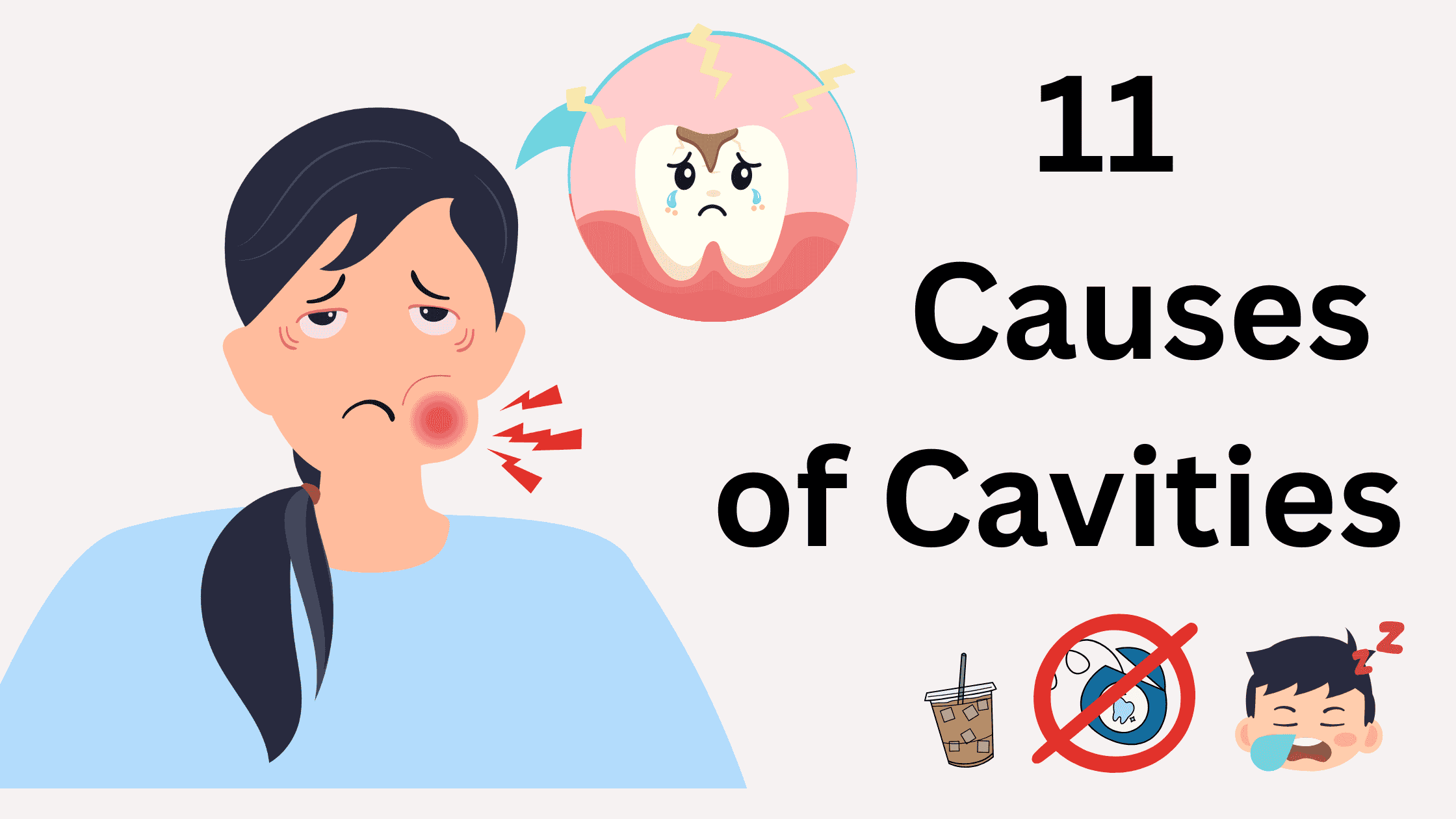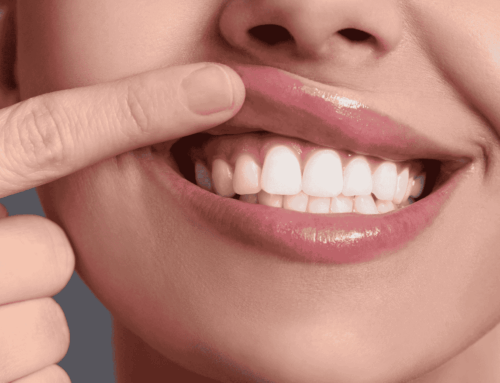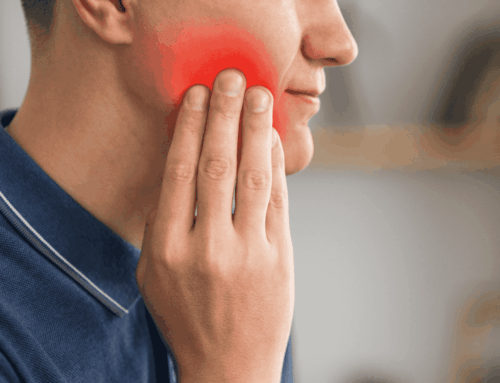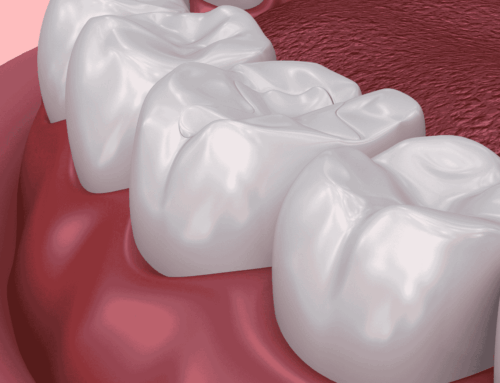By Dr. Nihal Nayak | General Dentist, BBiomedSc (Aus), BBiomedSc (Hons), BDentHSc (Aus), MDent (Aus)
Cavities are one of the most common dental issues out there, but not all of their causes are obvious. While most people know that sugar and poor brushing habits can lead to decay, there are plenty of other factors that fly under the radar. In fact, even patients who stick to a solid oral care routine can still find themselves facing unexpected cavities.
That’s why understanding the lesser-known triggers is so important. From hidden acids in your diet to habits you might not think twice about, these everyday causes could be putting your teeth at risk. The good news? Once you know what to watch for, you can take simple steps to avoid future damage.
In this article, we’ll walk through 11 surprising reasons cavities form, and what you can do to stay ahead of them.
1. Snacking All Day Long
It’s not just what you eat, it’s how often. Constant snacking, even on healthy foods, can create the perfect environment for cavities to form. Every time you eat, the bacteria in your mouth feed on sugars and starches, releasing acids that weaken your enamel. When you’re eating throughout the day, your teeth never get a break from this acid attack.
As dental specialists in Doncaster, we often remind patients that even small bites, like sipping coffee with creamer or snacking on crackers, can keep your mouth in an acidic state. That gives your saliva less time to neutralize acids and repair your enamel, which over time can lead to decay.
If you find yourself reaching for snacks often, try limiting them to set times during the day and rinse with water afterward. Giving your mouth a break between meals can go a long way in protecting your smile.
2. Sipping Sugary Drinks Slowly
Taking your time with a sweet drink might seem harmless, but it can quietly damage your teeth. When you sip slowly over a long period, whether it’s soda, sweet tea, or even juice, you’re exposing your enamel to sugar and acid again and again. Each sip restarts the clock on acid attacks, keeping your teeth under stress for much longer than you might expect.
This repeated exposure gives cavity-causing bacteria more fuel to produce acid, which weakens the outer layer of your teeth. And if you’re sipping throughout the day without rinsing or brushing, that damage can build up quickly. Even sugar-free drinks like diet soda can be acidic enough to wear down enamel over time.
To protect your teeth, try to enjoy sweet drinks in one sitting instead of dragging them out. Drinking water afterward can also help wash away sugars and neutralize acids, giving your enamel a better chance to recover.
3. Not Visiting the Dentist Regularly
Your teeth might feel fine, but skipping regular dental visits can allow small issues, like early cavities, to go unnoticed. These problems often develop quietly, becoming harder and more expensive to treat the longer they’re left unchecked. That’s why routine checkups are so important for early detection and prevention.
During your visit, your dentist does more than check for decay. They also monitor your gum health, enamel strength, and signs of wear that could affect your smile over time. Cleanings go beyond your daily routine by removing hardened plaque in areas your toothbrush might miss.
If it’s been a while since your last appointment, now’s a good time to get back into a healthy rhythm. A friendly, experienced dental team, like ours at The Pines Dental Centre, is here to support you every step of the way.
4. Acid Reflux (GERD)
Cavities don’t always start with sugar, sometimes, the issue begins in your stomach. If you deal with acid reflux or gastroesophageal reflux disease (GERD), stomach acid can make its way up into your mouth, especially at night. That acid is extremely strong and can wear away the protective enamel on your teeth.
Over time, this constant acid exposure weakens your enamel, making it easier for cavities to form. And because GERD often happens while you’re sleeping, you may not even notice the damage until it’s already progressed. Patients with untreated reflux may also notice increased tooth sensitivity, thinning enamel, or small pits in the back teeth.
If you’ve been diagnosed with acid reflux, or if you regularly experience heartburn, it’s important to let your dentist know. Working with both your dentist and doctor can help reduce your symptoms and protect your teeth in the long run.
5. Brushing Too Hard
Brushing regularly is essential, but brushing too hard can do more harm than good. It might feel like you’re giving your teeth a deep clean, but aggressive brushing can actually wear down your enamel and irritate your gums. Over time, this damage can lead to sensitivity and make it easier for cavities to form.
Your enamel is tough, but it’s not invincible. Scrubbing with too much force or using a hard-bristled toothbrush can slowly erode that protective layer. And once enamel wears away, it doesn’t grow back, leaving your teeth more vulnerable to decay.
If you notice your gums receding or your teeth feeling sensitive, your brushing technique might be the culprit. Try switching to a soft-bristled toothbrush and focus on gentle, circular motions. You don’t need to press hard to get a good clean, just consistency and the right technique.
6. Not Flossing
Brushing only gets you so far. Without flossing, you’re missing about a third of your tooth surfaces, especially the tight spaces where bacteria love to hide. Plaque and food debris can build up between your teeth, and over time, that buildup turns into cavities you can’t see or feel until it’s too late.
Even if your brushing routine is solid, skipping floss means you’re leaving behind harmful bacteria every day. These bacteria produce acids that eat away at enamel, particularly along the gumline and between teeth. That’s why cavities often form in areas that a toothbrush just can’t reach.
The good news is that flossing doesn’t take much time, it’s just about building the habit. Whether you use traditional floss, floss picks, or a water flosser, the key is consistency. Cleaning between your teeth daily helps protect against decay and keeps your whole mouth healthier in the long run.
7. Hidden Sugars in “Healthy” Foods
Not all sugars come from candy and desserts. Many foods marketed as “healthy” are packed with hidden sugars that can quietly harm your teeth. Yogurt, granola bars, fruit juices, and even some protein shakes often contain more sugar than you’d expect, especially if they’re flavored or processed.
Even natural sugars, like those found in dried fruit or smoothies, can feed cavity-causing bacteria if they linger on your teeth. Because these options seem wholesome, many people don’t think twice about how often they’re consuming them. But if they’re part of your daily routine, they could be contributing to enamel erosion and decay.
That doesn’t mean you need to cut them out entirely. Instead, be mindful of the labels and try to rinse with water after eating or drinking anything sweet, even if it’s labeled “organic” or “low-fat.” A few small changes in how you enjoy these foods can help protect your teeth without compromising your nutrition.
8. Dry Mouth (Xerostomia)
Saliva does more than just keep your mouth comfortable, it’s one of your best natural defences against cavities. When you have dry mouth, or xerostomia, your body isn’t producing enough saliva to wash away food particles, neutralise acids, or strengthen enamel. That lack of moisture creates the perfect environment for decay to develop.
Several things can cause dry mouth, including certain medications, dehydration, smoking, or underlying health conditions. You might notice a sticky feeling, frequent thirst, or even bad breath, all signs that your saliva flow is too low. And without that protective barrier, your teeth become more vulnerable to cavities, even if you brush and floss regularly.
If dry mouth is a daily issue, don’t ignore it. Drinking more water, avoiding tobacco, and using saliva-boosting products can all help. Your dentist can also recommend treatments or adjustments based on what’s causing it, so you can protect your oral health and stay more comfortable day to day.
9. Not Drinking Enough Water
Water plays a bigger role in your oral health than you might think. It helps rinse away leftover food, dilute acids, and keep your mouth moist, creating a healthier environment for your teeth. When you don’t drink enough, those helpful effects fade, and your risk for cavities quietly increases.
Unlike sugary drinks or even acidic juices, water doesn’t feed bacteria. In fact, it works against them by helping your saliva do its job more effectively. And if your local tap water contains fluoride, you’re also giving your enamel an extra layer of protection with every sip.
If you tend to go hours without drinking or rely mostly on coffee or soda, it’s time to rethink your hydration habits. Keeping a bottle of water nearby can make a big difference in how your mouth feels, and how well your teeth stay protected throughout the day.
10. Genetic Factors
Sometimes, cavities have less to do with your habits and more to do with your genes. The shape of your teeth, the strength of your enamel, and even how much saliva your body produces can all be influenced by heredity. So even with great oral hygiene, some people may still be more prone to tooth decay than others.
For example, deeper grooves in your molars can trap food more easily, while thinner enamel may wear down faster. Some individuals also naturally produce less saliva, which reduces the mouth’s ability to fight off cavity-causing bacteria. These inherited traits don’t guarantee you’ll get cavities, but they can raise your risk.
That’s why regular dental checkups matter. By understanding your unique risks, your dentist can recommend personalised strategies, like using prescription-strength fluoride toothpaste or applying dental sealants. With the right care, even genetics don’t have to stand in your way.
11. Mouth Breathing at Night
You might not even realise it’s happening, but breathing through your mouth while you sleep can quietly increase your risk of cavities. When your mouth stays open overnight, it tends to dry out. And without enough saliva, your teeth lose one of their best natural defences against decay.
Saliva plays a crucial role in neutralising acids, washing away food particles, and helping your enamel repair itself. But when your mouth gets dry, harmful bacteria have an easier time sticking to your teeth and causing damage. Over time, this dry environment can lead to enamel erosion and more frequent cavities, even if you brush and floss regularly.
If you wake up with a dry mouth or bad breath, mouth breathing could be part of the problem. It’s worth bringing up with your dentist, especially if it happens often. Simple solutions like using a humidifier, staying hydrated, or addressing nasal congestion can help protect your smile while you sleep.
Final Thoughts
We believe prevention starts with knowledge, and continues with personalised care. If you’re worried about cavities or haven’t had a checkup in a while, we’re here to help you take the next step with confidence.
Our team takes the time to understand your unique needs and create a treatment plan that works for you. Whether it’s your routine cleaning or a deeper conversation about dental health habits, we’re committed to keeping your smile healthy, strong, and cavity-free.
Book your appointment today and let’s make sure those hidden causes don’t catch you off guard.
Author

Dr. Nihal Nayak
General Dentist – BBiomedSc (Aus), BBiomedSc (Hons), BDentHSc (Aus), MDent (Aus)
Dr. Nihal Nayak is a highly qualified general dentist with a strong academic foundation in biomedical and dental sciences.
Passionate about comprehensive patient care, he takes pride in creating a welcoming environment while delivering clinical excellence.
His goal is to empower patients with knowledge and confidence in every aspect of their dental health.






